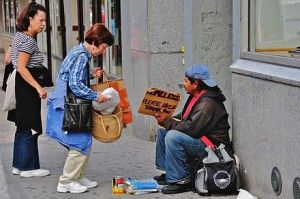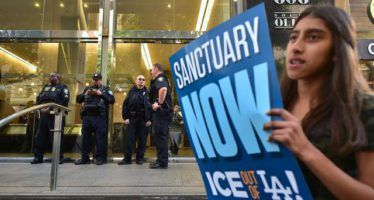Homeless ‘bill of rights’ up for Sacramento debate
 It could soon get easier to live on the streets in the Golden State. As controversy swirled around the police shooting of a homeless and mentally ill man on Skid Row in Los Angeles, legislators in California considered a new set of regulations activists said would “decriminalize” homelessness by providing a so-called “right to rest” in public.
It could soon get easier to live on the streets in the Golden State. As controversy swirled around the police shooting of a homeless and mentally ill man on Skid Row in Los Angeles, legislators in California considered a new set of regulations activists said would “decriminalize” homelessness by providing a so-called “right to rest” in public.
The “right to rest” movement has picked up steam first on the West Coast, with similar bills under review in the Hawaii and Oregon legislatures.
Following suit, state Sen. Carol Liu, D-La Cañada-Flintridge, introduced Senate Bill 608, known as the Right to Rest Act. Using broad language written by the Western Regional Advocacy Project, the bill would enshrine such actions as eating in public and occupying legally parked cars as “basic human and civil rights.”
What’s more, SB608 would authorize someone discriminated against in the use of public space to sue to enforce their newly codified rights in a civil action.
In a statement, Liu described homelessness as a “social,” not criminal, issue. “Citing homeless people for resting in a public space can lead to their rejection for jobs, education loans and housing, further denying them a pathway out of poverty,” she said.
Last month, Berkeley Law’s Policy Advocacy Clinic released a report on “the growing enactment and enforcement of anti-homeless laws in the Golden State.” In a forceful denunciation of California’s current homeless policies, the Clinic pushed for the kind of changes WRAP helped draft into model legislation:
“Without state-level intervention, California cities have been engaged in a race to the bottom by increasing criminalization, hoping to drive homeless people elsewhere and make them someone else’s problem. Comprehensive reform must target the full range of state codes and municipal laws that criminalize homelessness.”
A pressure cooker
SB608 comes at a time when homeless issues in cities like San Francisco and Los Angeles have gained a higher profile as a result of rising rents in urban cores.
As CalWatchdog.com reported, the Skid Row shooting of the man known as Africa drew sharp rebuke from community activists in downtown Los Angeles, some of whom pinned blame on the LAPD’s new Safer Cities Initiative. That effort targeted Skid Row — now at the frontier of downtown’s gentrification — with increased monitoring conducted in part by cops with beefed-up training in how to interact with the homeless and mentally unwell.
Critics noted that, although the initiative launched in 2006 by then-police chief William Bratton cut crime, it imposed an unending series of infractions on the homeless. Activists complained that more than half of Skid Row-area homeless had been arrested in the past year.
The problem seemed cyclical: one reason why Skid Row hosted one of the densest populations of homeless in America was because the surrounding areas had seen a robust influx of new renters and owners, raising housing costs.
Mainstreaming a worldview
Despite the fairly radical, social-justice approach taken by the activists who are shaping “right to rest” legislation, the agenda found an advocate in Liu, widely perceived as safely mainstream. On her official website, Liu recently touted her perfect legislative track record last year, when she went eight for eight of her bills enacted into law.
For Paul Boden, director of WRAP, activists’ appropriate ambitions reached nationwide. Himself homeless as a teen, Boden has volunteered and worked on homeless issues for 30 years.
Now he has sensed the stars are aligning for a push that extends far beyond the West Coast. Boden insisted, “From Hawaii to New York and from Maine to Texas, it’s time for this to stop.”
Related Articles
California set to become ‘sanctuary state’ after deal between governor and state Senate leader
Gov. Jerry Brown and Senate President Pro Tem Kevin de León, D-Los Angeles, reached a compromise on the state’s “sanctuary
Critics warn drug mandate will increase health care costs
A prescription drug bill, Assembly Bill 339, would save money for many with chronic medical conditions. But critics warn that
Gridlock On Renewable Energy Highway
MAY 24, 2011 By K. LLOYD BILLINGSLEY California politicians want to draw 33 percent of the state’s energy needs from




